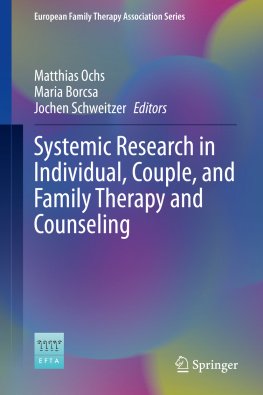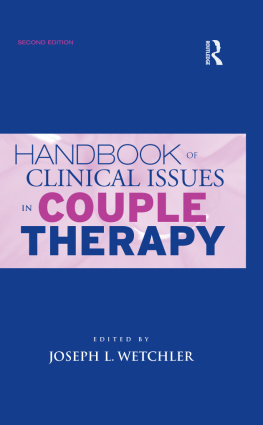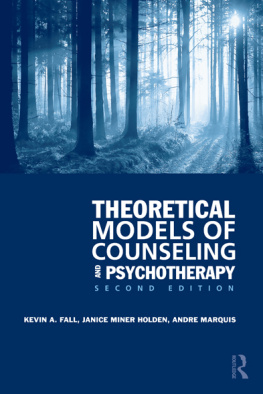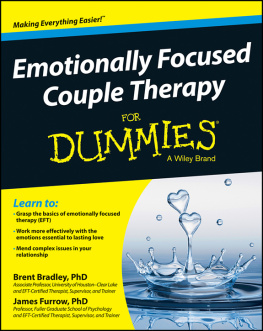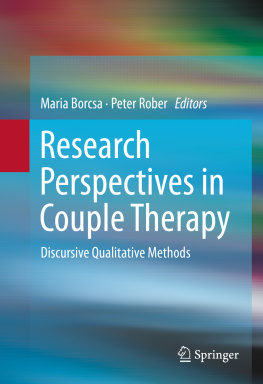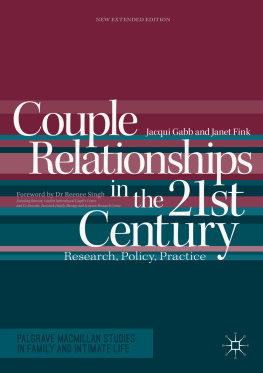Matthias Ochs - Systemic Research in Individual, Couple, and Family Therapy and Counseling
Here you can read online Matthias Ochs - Systemic Research in Individual, Couple, and Family Therapy and Counseling full text of the book (entire story) in english for free. Download pdf and epub, get meaning, cover and reviews about this ebook. year: 2020, publisher: Springer International Publishing, genre: Home and family. Description of the work, (preface) as well as reviews are available. Best literature library LitArk.com created for fans of good reading and offers a wide selection of genres:
Romance novel
Science fiction
Adventure
Detective
Science
History
Home and family
Prose
Art
Politics
Computer
Non-fiction
Religion
Business
Children
Humor
Choose a favorite category and find really read worthwhile books. Enjoy immersion in the world of imagination, feel the emotions of the characters or learn something new for yourself, make an fascinating discovery.
- Book:Systemic Research in Individual, Couple, and Family Therapy and Counseling
- Author:
- Publisher:Springer International Publishing
- Genre:
- Year:2020
- Rating:3 / 5
- Favourites:Add to favourites
- Your mark:
- 60
- 1
- 2
- 3
- 4
- 5
Systemic Research in Individual, Couple, and Family Therapy and Counseling: summary, description and annotation
We offer to read an annotation, description, summary or preface (depends on what the author of the book "Systemic Research in Individual, Couple, and Family Therapy and Counseling" wrote himself). If you haven't found the necessary information about the book — write in the comments, we will try to find it.
Matthias Ochs: author's other books
Who wrote Systemic Research in Individual, Couple, and Family Therapy and Counseling? Find out the surname, the name of the author of the book and a list of all author's works by series.
Systemic Research in Individual, Couple, and Family Therapy and Counseling — read online for free the complete book (whole text) full work
Below is the text of the book, divided by pages. System saving the place of the last page read, allows you to conveniently read the book "Systemic Research in Individual, Couple, and Family Therapy and Counseling" online for free, without having to search again every time where you left off. Put a bookmark, and you can go to the page where you finished reading at any time.
Font size:
Interval:
Bookmark:
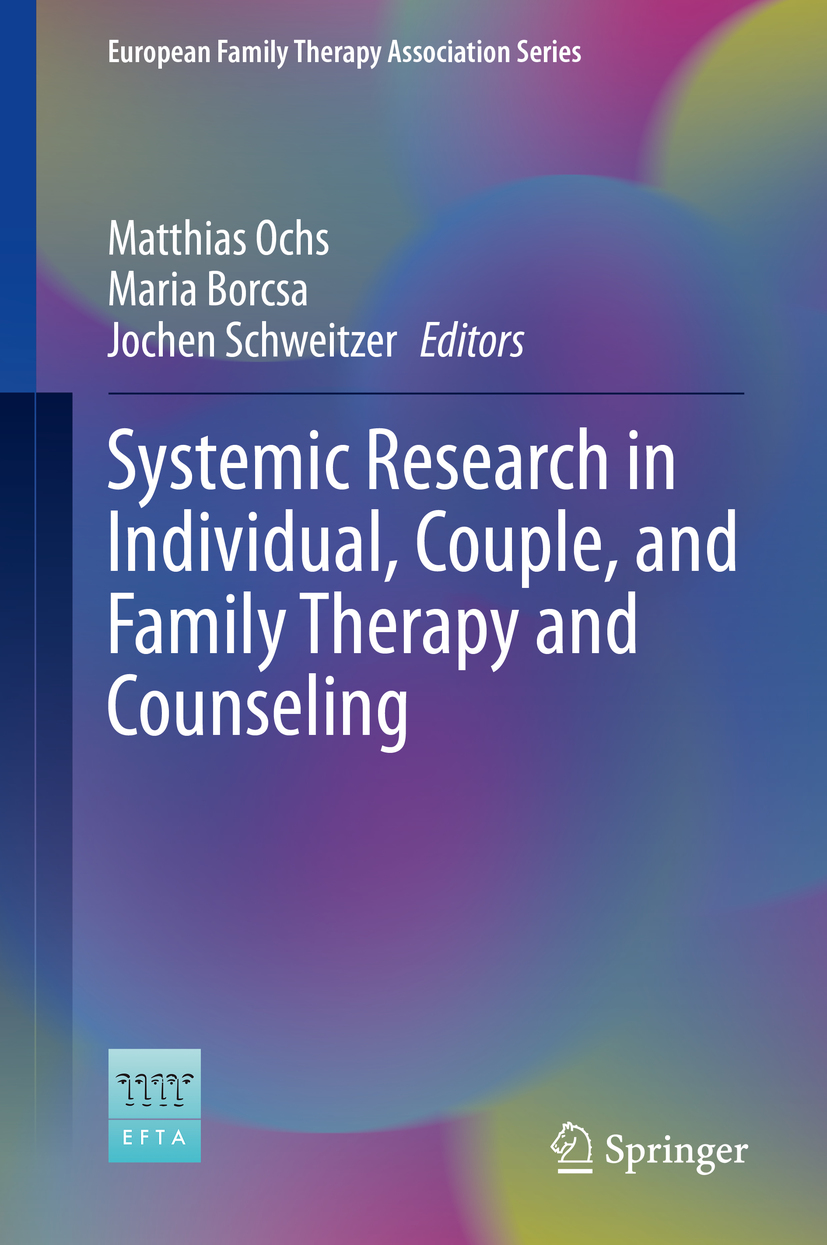
This series offers contributions from the European Family Therapy Associations community of senior authors and experienced editors. It brings together state-of-the-art contributions on crucial issues in family therapy in Europe with a focus on systemic family therapy. The topics alternate between those that make research findings accessible and of immediate value to practitioners and those that cover clinical areas. This series is essential reading for family therapists, counselors, and social workers across the globe.
More information about this series at http://www.springer.com/series/13797

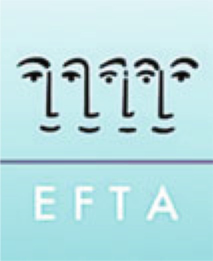
This Springer imprint is published by the registered company Springer Nature Switzerland AG
The registered company address is: Gewerbestrasse 11, 6330 Cham, Switzerland
The European Family Therapy Association (EFTA) was established in 1990, integrating today 32 national organizations of family therapy all over Europe (EFTA-NFTO), plus the so-called foreign members from Canada, Brazil, Chile, Israel, Senegal and the USA, with 136 training institutes (EFTA-TIC) and 1100 individual members (EFTA-CIM). EFTA is an international association dedicated to scientific purposes. It is an independent and strictly nonprofitmaking association (Borcsa, 2017).
EFTAs involvement with the Heidelberg systemic research conferences started in 2009. Maria Borcsa, then chair of EFTAs Chamber of National Family Therapy Organisations (NFTO) and representative of the two German systemic associations in EFTA, convened a European meeting in Leipzig. The presidents of the two German associations, Cornelia Oestereich (for Systemische Gesellschaft (SG)) and Jochen Schweitzer (for Deutsche Gesellschaft fr Systemische Therapie, Beratung und Familientherapie (DGSF)), were present to welcome all delegates. A scientific event had become a good tradition during these assemblies.
After that meeting, Jochen Schweitzer wrote to Peter Stratton:
We met in Leipzig on a Friday evening in June (Your wife and grandson were there, too) and talked briefly about your work with SCORE. I want to invite you to come as a presenter to a conference called Systemic research in therapy, education and organizational development. You will meet approx. 150 highly motivated researchers and practitioner-researchers.
I would like you to participate in a two-hour symposium on systemic research and the promotion of systemic research in Great Britain. I believe we Germans can learn a lot from you British folks in particular in that respect. () And we ask you to do a research methodology workshop on developing the SCORE in the afternoon of that same day. ().
At the following 2010 Heidelberg conference, Peter duly presented on SCORE as a collaborative endeavour of European systemic therapists (Stratton, Bland, Janes, & Lask, 2010), the German version of SCORE was translated and introduced by Maria (Borcsa & Schelenhaus, 2011). SCORE, an indicator of family functioning and therapeutic change, is both a purpose-built measure of therapeutic progress and an indicator of quality of life within the family and has become freely available on the EFTA website in more than 20 languages: in this book).
Subsequently, the EFTA Board recognized the work of Alan Carr and Peter Stratton by an EFTA Award for their contributions to family therapy research (Carr & Stratton, 2017). This prize was not the sole indication that the role of research within EFTA had increased during the years.
At the start of the presidency of Arlene Vetere (20042010), an NFTO Research Support Group and a wider Research Task Force were established with Peter Stratton (chair), Mina Polemi Todoulou and Nevena alovska Hercog as members. Their mission was to survey existing research in EFTAs training institutes, national organizations and individual members and to promote more (outcome) research throughout the organization. The EFTA Research Committee was formally constituted in 2010 with Peter Stratton as chair. Arlenes strong support for research was continued by the two subsequent EFTA presidents, Kyriaki Polychroni (20102013) and Maria Borcsa (20132017). For more details on the development of EFTA and the role of research, see Borcsa, Hanks and Vetere (2013) and Borcsa and Stratton (2016).
EFTA was fortunate to have a succession of leaders who supported research and put EFTA in a strong position for its members of EFTA to become regular contributors to the Heidelberg conferences. In 2014, EFTA formally became a participating organization and the conference developed into a European Systemic Research Conference, correspondingly with active participation of the authors: Maria Borcsa gave a keynote speech on The State of Implementation of Systemic Therapy in the National Health Care Systems in Different European Countries (Borcsa, 2016) and organized an EFTA Research Group Symposium on Qualitative Research in Couple and Family Therapy: Multiple Perspectives (Borcsa & Rober, 2016). Peter Stratton presented a keynote on Researching the Effectiveness of Systemic Therapy Within Europe, a discussion panel Evidence-Based Systemic Research and Practice and a workshop Knowing What We Are Trying to Achieve: Assessing Therapeutic Progress Through Quality of Life in the Family System The SCORE Index of Family Functioning and Change.
Font size:
Interval:
Bookmark:
Similar books «Systemic Research in Individual, Couple, and Family Therapy and Counseling»
Look at similar books to Systemic Research in Individual, Couple, and Family Therapy and Counseling. We have selected literature similar in name and meaning in the hope of providing readers with more options to find new, interesting, not yet read works.
Discussion, reviews of the book Systemic Research in Individual, Couple, and Family Therapy and Counseling and just readers' own opinions. Leave your comments, write what you think about the work, its meaning or the main characters. Specify what exactly you liked and what you didn't like, and why you think so.

